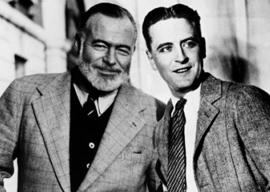
April 13, 2012

Ernest Hemingway and F. Scott Fitzgerald
Papa Hemingway’s recently published letter to an Italian male friend purportedly revealed the “human side” of which his admirers were already well aware. (Like Bogie, he was tough on the outside, jelly on the inside.) Until lately, Papa’s haters had a good long run. Soon after Carlos Baker’s matchless biography appeared in 1972, 11 years after Hemingway’s suicide, the naysayers started to gnaw away at Papa. The rats were led by modernists, feminists, and other such rubbish, the kind of non-talented, self-aggrandizing phonies that have turned literature into the unreadable garbage that’s around today. Papa’s straight, short, no-nonsense style didn’t suit them. Magic realism did. It hid their lack of talent. He wrote about tough guys doing the honorable thing, something the sandal-wearing sissies who came after him couldn’t imagine doing.
I’ve just finished a 544-pager called Hemingway’s Boat by Paul Hendrickson, in which that old story of Papa versus Scott Fitzgerald comes up, both sides generously treated by the author. In 1933, seven years before his death, poor old Scott was broke, potted, and praying that Tender is the Night would resuscitate his fading reputation. Zelda was institutionalized after a breakdown and her affair with a French aviator which had just about finished Scott. Tender is my favorite book of all time. I read it at 15, immediately after my first visit to the French Riviera. In late-night bull sessions, when fellow students would talk about their future plans, I only had one—go to the Riviera and find Dick Diver and live like him. After that it was Paris, looking for Jake Barnes and Lady Brett. Screw banking and screw shipowning; such trifles were for dullards and bores.
I did run into some characters who resembled Dick and Jake, and certainly more than a few women who were like Brett, but real life can never live up to fiction. Not the kind that Papa and Scott wrote. Fitzgerald had written Tender when the Jazz Age was over, just as the Depression had really begun to bite, while deeply in debt and in despair over Zelda’s schizophrenia. Hemingway had supplanted him as the numero uno star writer at Scribner’s, but Scott didn’t have an envious bone in his body. It was all great talent and self-destruction. Fitzgerald ached to hear from Papa about Tender. At first Hemingway gave it a thumbs-down. “I talk with the authority of failure—Ernest with the authority of success,” Fitzgerald lamented.
Scott had gone on a long bender leading up to his book’s publication and Papa was annoyed with him. Scott would pass out on the table, lie down on the floor, and invariably puke all over the place. I think if it had been anyone else, Hemingway would have put him to sleep with a left hook. Instead, he told Fitzgerald that he oughtn’t let Zelda’s psychoanalysis ball him up about himself and that if he didn’t keep writing, it meant he was yellow. Grand stuff, because there was nothing lower than being yellow back in those heroic times.